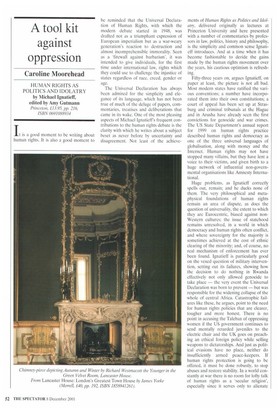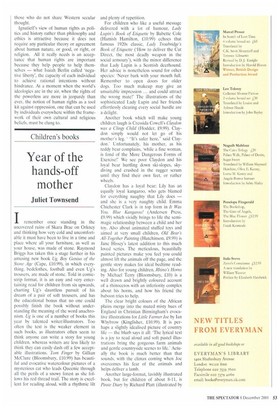A tool kit against oppression
Caroline Moorehead
HUMAN RIGHTS AS POLITICS AND IDOLATRY by Michael Ignatieff, edited by Amy Gutmann Princeton,f13.95, pp. 216, ISBN 0691088934 It is a good moment to be writing about human rights. It is also a good moment to
be reminded that the Universal Declaration of Human Rights, with which the modern debate started in 1948, was drafted not as a triumphant expression of European imperialism but as a war-weary generation's reaction to destruction and almost incomprehensible immorality. Seen as a 'firewall against barbarism', it was intended to give individuals, for the first time under international law, rights which they could use to challenge the injustice of states regardless of race, creed, gender or age.
The Universal Declaration has always been admired for the simplicity and elegance of its language, which has not been true of much of the deluge of papers, commentaries, treatises and deliberations that came in its wake. One of the most pleasing aspects of Michael Ignatieff's frequent contributions to the human rights debate is the clarity with which he writes about a subject beset as never before by uncertainty and disagreement. Not least of the achieve
ments of Human Rights as Politics and Idolatry, delivered originally as lectures at Princeton University and here presented with a number of commentaries by professors in law, politics, history and philosophy, is the simplicity and common sense Ignatieff introduces. And at a time when it has become fashionable to deride the gains made by the human rights movement over the years, his cautious optimism is refreshing.
Fifty-three years on, argues Ignatieff, on paper at least, the picture is not all bad. Most modern states have ratified the various conventions; a number have incorporated them into their own constitutions; a court of appeal has been set up at Strasburg and criminal tribunals at the Hague and in Arusha have already seen the first convictions for genocide and war crimes. The US State Department's annual report for 1999 on human rights practice described human rights and democracy as one of the three universal languages of globalisation, along with money and the Internet. Human rights may not have stopped many villains, but they have lent a voice to their victims, and given birth to a huge network of influential non-governmental organisations like Amnesty International.
Huge problems, as Ignatieff correctly spells out, remain; and he ducks none of them. The very philosophical and metaphysical foundations of human rights remain an area of dispute, as does the question of universality, the extent to which they are Eurocentric, biased against nonWestern cultures; the issue of statehood remains unresolved, in a world in which democracy and human rights often conflict, and where sovereignty for the majority is sometimes achieved at the cost of ethnic clearing of the minority; and, of course, no real mechanism of enforcement has ever been found. Ignatieff is particularly good on the vexed question of military intervention, setting out its failures, showing how the decision to do nothing in Rwanda effectively not only allowed genocide to take place — the very event the Universal Declaration was born to prevent — but was responsible for the widening collapse of the whole of central Africa. Catastrophic failures like these, he argues, point to the need for human rights policies that are clearer, tougher and more honest. There is no point in accusing the Taleban of oppressing women if the US government continues to send mentally retarded juveniles to the electric chair and the UK goes on preaching an ethical foreign policy while selling weapons to dictatorships. And just as political evasions have no place, neither do insufficiently armed peace-keepers. If human rights protection is going to be offered, it must be done robustly, to stop abuses and restore stability. In a world constantly at war there is no room for lofty talk of human rights as a 'secular religion', especially since it serves only to alienate those who do not share Western secular thought.
Ignatieff's view of human rights as politics and history rather than philosophy and ethics is attractive because it does not require any particular theory or agreement about human nature, or good, or right, or religion. All it really needs is an acceptance that human rights are important because they help people to help themselves — what Isaiah Berlin called 'negative liberty', the capacity of each individual to achieve rational intentions without hindrance. At a moment when the world's ideologies are in the air, when the rights of the powerless are more in jeopardy than ever, the notion of human rights as a tool kit against oppression, one that can be used by individuals everywhere within the framework of their own cultural and religious beliefs, must be clung to.























































































 Previous page
Previous page